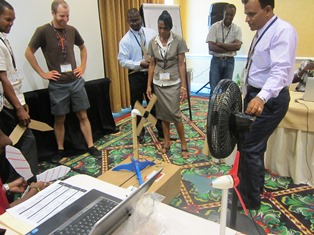
A number of countries in the region are hoping to make their energy future brighter by incorporating lessons on energy efficiency into the classroom. An upcoming regional workshop will examine some of the most effective ways to enlighten students about responsible energy use long before they ever have to pay an electric bill.
The OAS-sponsored workshop—“Promoting a Scientific Culture towards Responsible Energy Use in Educational Environments”—will take place November 16-18 in Lima, Peru, and will include participants from seven countries. They will have an opportunity to share teaching methodologies, research, and best practices on how to make responsible energy use part of the basic school curriculum.
The OAS member countries understand the long-term importance of education in building stronger societies. The Inter-American Democratic Charter puts it this way: “Education is key to strengthening democratic institutions, promoting the development of human potential, and alleviating poverty and fostering greater understanding among our peoples.”
 In many countries, lessons on the environment and sustainable development are already part of the basic school curriculum, but the goal is to encourage the development of content on energy efficiency and renewable energy as well. Interest in holding this workshop grew out of initial technical exchanges on the topic among Chile, Colombia, Peru, United States, and Uruguay, through the ECPA Working Group on Energy Efficiency.
In many countries, lessons on the environment and sustainable development are already part of the basic school curriculum, but the goal is to encourage the development of content on energy efficiency and renewable energy as well. Interest in holding this workshop grew out of initial technical exchanges on the topic among Chile, Colombia, Peru, United States, and Uruguay, through the ECPA Working Group on Energy Efficiency.
The workshop will provide an opportunity for those countries to delve deeper into the educational programs they have developed on renewable energy and energy efficiency, and discuss the most effective theoretical frameworks and practical teaching methods. They also hope to lay a foundation for potential technical cooperation across the region on encouraging a scientific culture around the issue of sustainable development and responsible energy use.
In addition to those five countries, representatives from Mexico will present findings from scientific classroom research on the topic. For their part, delegates from the Dominican Republic will participate to learn hemispheric best practices on teaching energy basics and raising awareness among schoolchildren as part of the educational component under the “Sustainable Energy Capacity Building Initiative” (SECBI). The delegates plan to share methodologies and materials they have developed through this ECPA initiative, to elicit ideas about how to adapt and improve them.
Honduras will also participate in the workshop, as it is interested in including more energy education in the school curriculum as part of the Trifinio Plan—a long-term development strategy being carried out in a tri-border region that also includes parts of El Salvador and Guatemala. Participants in the workshop will also learn about some of the progress made under the Caribbean Energy Awareness and Education Programme (CEEAP), which supports capacity-building for teachers and students.
 View Map
View Map